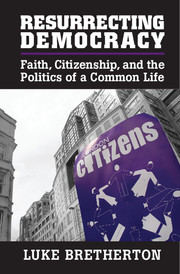6 - Civil Society as the Body Politic
Published online by Cambridge University Press: 18 December 2014
Summary
This chapter assesses how broad-based community organizing (BBCO) generates a common world of meaning and action between diverse traditions in a particular place. This sensus communis enables political judgments to be made on the basis of a shared practical rationality. The chapter opens by reflecting on how, as a practice-based rather than a theoretically driven form of politics, BBCO is able to incorporate multiple traditions of belief and practice. It then considers how the modern urban condition presents a crisis to political life – in particular, to the ability to make reasoned political judgments – and how BBCO, as a response to this crisis, constitutes a means of demanding and enabling political judgments to be made. Building on this, the chapter examines the interdependence within BBCO of democratic politics, practical reason, and the existence of communities of virtue.
Until now I have been working with a conception of politics derived from the internal discourses of the IAF and which explicitly draws from the work of Arendt, Aristotle, Crick, and Wolin. We have also consistently seen how the Alinsky approach to community organizing engages in conflict and confrontation as well as conciliation and has implicit within its practice a critique of conceptions of politics that are overly wedded to dialogue and consensus as the normative image of what constitutes “good” politics. In this chapter I will further develop the theoretical conception of politics used by organizers but also try to supplement and enrich it by taking seriously the conceptions of public action, power, anger, and confrontation that BBCO incorporates and that were discussed in Chapters 4 and 5.
- Type
- Chapter
- Information
- Resurrecting DemocracyFaith, Citizenship, and the Politics of a Common Life, pp. 179 - 218Publisher: Cambridge University PressPrint publication year: 2014
- 1
- Cited by

